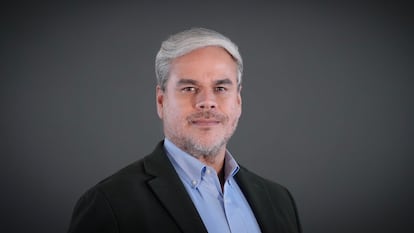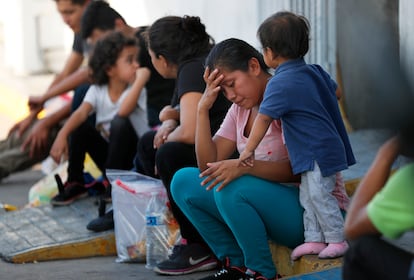Alfonso Mercado, psychologist and expert in immigration trauma: ‘The only crisis at the border is that of mental health’
The clinical psychology professor has been working at the border for a decade, where he has witnessed all kinds of abuse and suffering. Now he is ‘very concerned of what’s to come’ under Trump’s second term


Alfonso Mercado’s work has turned his hair gray. And his beard. In fact, at 46, his hair is completely white, and he blames his work as a psychologist on the U.S.-Mexico border. Mercado — who is also a professor of clinical psychology at the University of Texas-Rio Grande Valley — has spent a decade researching the trauma suffered by the millions of foreigners who arrive in the country’s southern border. He has done so during four presidencies: Barack Obama’s, Donald Trump’s first, Joe Biden’s and now Trump’s second term. And throughout that time, regardless of whether there was a Democrat or a Republican in the White House, he has been witness to the abuses and high levels of suffering that plague the area.
In an interview with EL PAÍS by video call, Mercado — the son of Mexican immigrants who was born in Los Angeles — describes some of the cases he has had to deal with. Like that of a 12-year-old boy who, after being separated from his family when crossing the border during Trump’s first term, began to show symptoms of schizophrenia. Or so it seemed: “He wasn’t communicating with anyone. He was talking to himself, pacing back and forth in his room. And they thought he was psychotic,” the doctor recalls. “[We] find out, upon further assessment, that the little boy was praying at night to his ancestors to be reunited with mom. So it wasn’t psychosis; we were dealing with a child experiencing symptoms of acute stress and post-traumatic stress disorder.”
Now, with Trump back, more powerful than before and with an immigration agenda that includes closing the border to asylum seekers and detaining and deporting millions of migrants, Mercado knows his job is more important than ever. “Because I’m very concerned about what’s to come,” he assures.
Question. You were there when the first Trump administration began separating families in 2018, something that forever changed U.S. immigration policy. What do you remember about those early cases?
Answer. I started seeing what I initially thought were isolated cases of family separations. At first, I was like, maybe it’s a human trafficking case, you know? But I kept getting referrals from the Office of Refugee Resettlement, Child Protective Services and different organizations and shelters wanting guidance. They would tell me, we have this 3-year-old boy and we think he’s autistic. He’s not communicating, he’s not eating, he’s not sleeping, and he’s soiling himself, so it must be autism, right? But 99.9% of the time, upon further assessment, once I would see them, it wasn’t autism. They were children with symptoms of acute stress and trauma. The same type of trauma symptoms I see in combat veterans, but these were the little kiddos.
Q. And did you also work with the families that were forced to wait in Mexico under the Migrant Protection Protocols, more commonly known as the “Remain in Mexico” program?
A. Yes, we did research and volunteer work at different tent encampments, one in Matamoros, Mexico, by the Brownsville border, for example. And the trauma rates we were seeing were so alarming. I’m a psychologist, so nothing really alarms me anymore. But what we were seeing were significant trauma symptoms and trauma exposure. The data pointed to this population far exceeding the clinical cutoff scale of PTSD of over 16 points. Sixteen points! That was when we started realizing that the only crisis at the border is that of mental health.

Q. What are the long-term effects of this type of trauma?
A. One thing I do want to make clear is that these policies that were in place, like the “zero tolerance” for family separation and “Remain in Mexico,” caused abuse. And so years later, when I visited some of the children that were separated in their homes across the countries, they were not the same, even if they were back with their parents. It was hard for them to integrate into a society that abused them. It was evident the trauma was everywhere. It was a daily part of their lives. It was affecting their personal functioning at home, their communication and socialization.
Q. What about their parents?
A. It was very concerning to me visiting some of those cases years later and seeing how it has affected not only that person, the child, but the family as well, their environment, their teachers, their community. It trickled down. You have these humans that endured significant trauma in their home countries. Let alone the trauma endured during their migration journey. Then they come to seek asylum here and they’re faced with these anti-immigration policies that are further exacerbating trauma symptomology.
Q. Are there enough mental health services and resources at the border?
A. What’s most concerning to me as a psychologist, other than the stories I’ve just shared with you, is that the immigration system as a whole is not trauma informed. There is no trauma-informed care for these people. Nothing.
Q. And now, in its second term, the Trump administration has relied on a strategy of instilling terror. They want people to believe that anyone can be detained and deported at any time, regardless of status.
A. This not only affects the undocumented individual and their families of mixed status, but it affects all U.S. citizens. They see on the news what’s going on and the fear is real. And that fear has no discrimination. Anyone can be experiencing that right now, in such uncertain times.

Q. The Trump government is bringing back some of the policies of its first administration, such as “Remain in Mexico.” As someone who worked with immigrants when those policies were first enacted, how are you preparing to do it again?
A. Now is even more important to leverage the science and human rights advocacy efforts. The last few years, the American Psychological Association, including myself and a small task force that we have, has been trying to do that. To shed light into the realities of our immigration system, especially down here in the front lines of the border, and show how we can inform advocacy efforts by leveraging that science and educate others and make them aware of how these policies are affecting people and their well-being.
Q. And what keeps you going after 10 years at it?
A. It’s really embedded in our ethical codes as psychologists: do no harm, help those that are in need. And also knowing that I’m playing a role in training future psychologists to do this kind of work down here at the border. Because my students love doing this kind of work because they know they’re making a difference and are giving a voice to the voiceless.
Sign up for our weekly newsletter to get more English-language news coverage from EL PAÍS USA Edition
Tu suscripción se está usando en otro dispositivo
¿Quieres añadir otro usuario a tu suscripción?
Si continúas leyendo en este dispositivo, no se podrá leer en el otro.
FlechaTu suscripción se está usando en otro dispositivo y solo puedes acceder a EL PAÍS desde un dispositivo a la vez.
Si quieres compartir tu cuenta, cambia tu suscripción a la modalidad Premium, así podrás añadir otro usuario. Cada uno accederá con su propia cuenta de email, lo que os permitirá personalizar vuestra experiencia en EL PAÍS.
¿Tienes una suscripción de empresa? Accede aquí para contratar más cuentas.
En el caso de no saber quién está usando tu cuenta, te recomendamos cambiar tu contraseña aquí.
Si decides continuar compartiendo tu cuenta, este mensaje se mostrará en tu dispositivo y en el de la otra persona que está usando tu cuenta de forma indefinida, afectando a tu experiencia de lectura. Puedes consultar aquí los términos y condiciones de la suscripción digital.








































